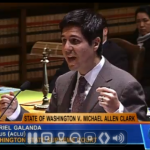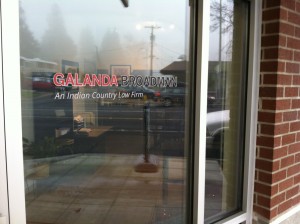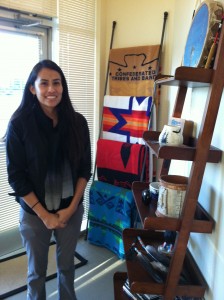Leading American indigenous rights scholar Professor Matthew Fletcher has published, "American Indian Legal Scholarship and the Courts: Heeding Frickey’s Call," in the March 2013 volume of California Law Review.
In the article, he cites law review articles by Gabe Galanda, Anthony Broadman and Ryan Dreveskracht, respectively, in "a list of articles produced in the five years or so since Frickey’s call that...have overcome the law review market’s hurdles to meet Frickey’s criteria."
In harkening the late Prof. Philip P. Frickey's call "for dramatic changes to the goals and methodologies of American Indian legal scholarship...in favor of more grounded and empirical scholarship, work that could inform the Court about the realities on the ground in Indian country," Prof. Fletcher concludes his paper with "a celebration of the impact Frickey’s call already has had on the academy":
[S]everal American Indian legal scholars are doing their damnedest to meet Frickey’s call. Federal and state judges are not the only audience. Legal scholarship is for practicing attorneys; tribal, state, and federal leaders; and many others, too. And so I conclude this short paper with my own reading list of recent work that unquestionably fulfills the call for new realism in American Indian legal scholarship. I include articles dating back five years or so that meet one or more of the criteria articulated by Frickey. I also add a list of excellent “nuts and bolts” articles.
Prof. Fletcher's "must-read" list includes:
Gabriel S. Galanda, Arbitration in Indian Country: Taking the Long View, 65 DISP.RESOL.J., Nov. 2010-Jan. 2011, at 30.
Anthony Broadman, Know Your Enemy: Local Taxation and Tax Agreements in Indian Country, AM. INDIAN L.J., Trial Issue 2012, at 1.
Ryan David Dreveskracht, Native Nation Economic Development Via the Implementation of Solar Projects: How to Make It Work, 68 WASH.&LEE L.REV. 27 (2011).
Gabe, Anthony and Ryan are truly honored by Prof. Fletcher's citation to and inclusion of their law review scholarship in his most important paper regarding the state and future of American Indian legal scholarship.
Gabriel "Gabe" Galanda is a partner at Galanda Broadman PLLC, of Seattle, an American Indian owned law firm. Trained by the American Arbitration Association, Gabe arbitrates disputes between tribal and non-tribal governments and other parties, as well as mediates such disputes. He is an enrolled member of the Round Valley Indian Tribes of Covelo, California. Anthony Broadman is also a partner at the firm, practicing in Bend, Oregon. His practice focuses on company-critical business litigation and representing tribal governments, especially in federal, state and local tax controversy. Ryan Dreveskracht is an associate at the firm. His practice focuses on representing businesses and tribal governments in public affairs, energy, gaming, taxation, and general economic development.





 "We are privileged to be entrusted to represent tribal governments and Indian people, frequently during very critical times. It is the opportunities that our tribal clients have given us, and the results we have been able to obtain for them, and the underlying teamwork with our clients and each other that resulted in this honor. We feel as grateful to our tribal clients for those opportunities as we feel honored by this accolade."
"We are privileged to be entrusted to represent tribal governments and Indian people, frequently during very critical times. It is the opportunities that our tribal clients have given us, and the results we have been able to obtain for them, and the underlying teamwork with our clients and each other that resulted in this honor. We feel as grateful to our tribal clients for those opportunities as we feel honored by this accolade." A few excerpts:
A few excerpts: Chrystal previously worked as a Indian Child Welfare Case Manager for the Tulalip Tribes; a Gang Intervention Counselor for the Muckleshoot Indian Tribe; a Corrections Officer for the Washington State Department Corrections at the McNeil Island Correction Center; a Case Management Assistant at Seattle Municipal Court; and an intern at the Yakama Nation Prosecutor’s Office. She will be applying to law school this fall.
Chrystal previously worked as a Indian Child Welfare Case Manager for the Tulalip Tribes; a Gang Intervention Counselor for the Muckleshoot Indian Tribe; a Corrections Officer for the Washington State Department Corrections at the McNeil Island Correction Center; a Case Management Assistant at Seattle Municipal Court; and an intern at the Yakama Nation Prosecutor’s Office. She will be applying to law school this fall. This honor follows several other recent honors for Galanda Broadman and its lawyers. Last month, Galanda Broadman recently received a prestigious Tier 1 ranking in the 2013 Edition of U.S. News - Best Lawyers “Best Law Firms,” in the arena of Native American Law. In addition, firm co-founder Gabe Galanda was named to The Best Lawyers in America in the practice areas of both Gaming Law and Native American Law, for the seventh straight year. Gabe was also recently named a "Difference Maker" by the American Bar Association.
This honor follows several other recent honors for Galanda Broadman and its lawyers. Last month, Galanda Broadman recently received a prestigious Tier 1 ranking in the 2013 Edition of U.S. News - Best Lawyers “Best Law Firms,” in the arena of Native American Law. In addition, firm co-founder Gabe Galanda was named to The Best Lawyers in America in the practice areas of both Gaming Law and Native American Law, for the seventh straight year. Gabe was also recently named a "Difference Maker" by the American Bar Association.


